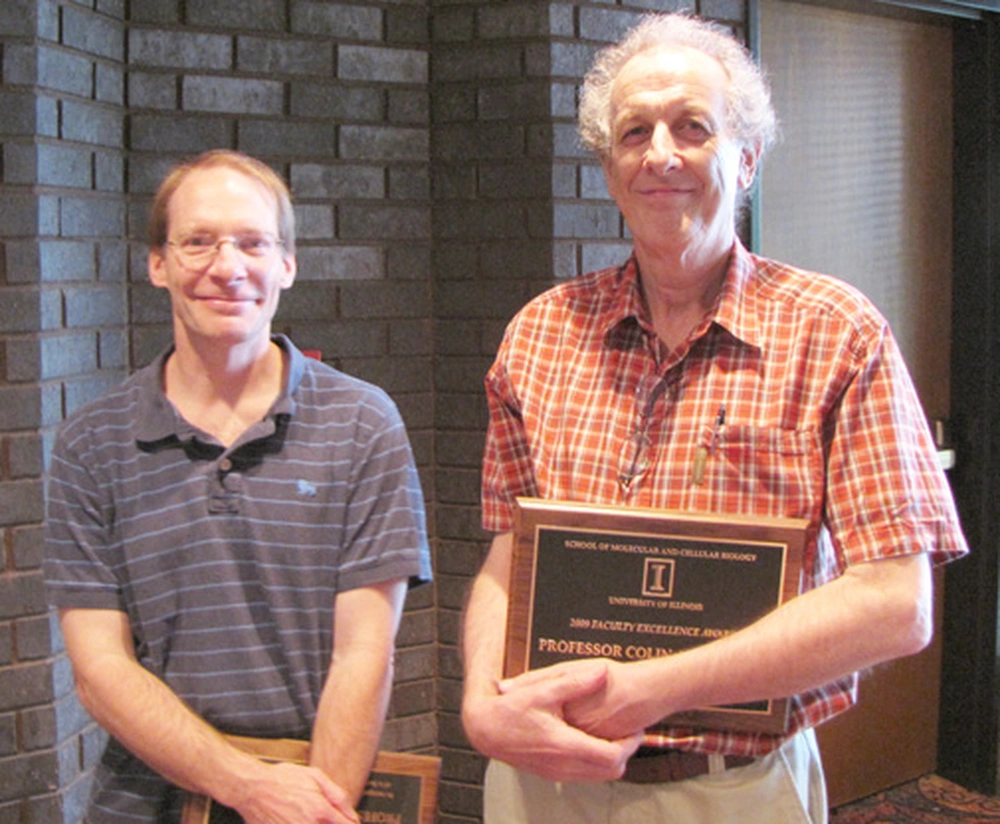
On Friday, September 10, in a ceremony at the Levis Faculty Center, the MCB Faculty Excellence Award for 2009 was presented to Professor of Biochemistry, Biophysics and Computational Biology, and Plant Biology Colin Wraight; and this year's award to Professor of Microbiology James Imlay.
About Colin Wraight, Professor of Biophysics and Computational Biology, and Professor and Interim Head of the Department of Biochemistry Susan Martinis writes:
"Colin has often said that he absolutely loves every aspect of his academic life and it shows....
"Colin has maintained long-standing external federal funding from both the NIH (since 1996) and NSF (since 1975). In addition, he is a collaborator in a multi-disciplinary team that has received a grant from the DOE....
"With an unwavering commitment, Colin has dedicated himself to enhancing every aspect of the teaching mission of the university. At the undergraduate level, he has endeavored to raise the quality of the Biochemistry degree to an 'elite' status, in part by instituting a research requirement among other threshold benchmarks. To reach out to new students, he initiated workshops for undergraduates in Biochemistry and, as a result of that, established a new course, Bioch 190 for incoming Freshman....
"As Department Head since 2004, Colin has steadily increased shouldering much of the burdens of the Biochemistry Department, most times nearly single-handed. One clear example is the Phase I renovation project of RAL [Roger Adams Lab] and its future plans, which are a legacy that should be attributed to Colin's relentless efforts. As one senior faculty member of my Department commented in the past week, 'Colin was able to do for the Biochemistry space in RAL, what no one has been able to do in 40 years.'"
James Imlay has made similarly outstanding contributions to the University of Illinois, according to Professor of Biochemistry and Professor and Head of Microbiology John Cronan:
"Imlay’s research is characterized by his deep insights plus the exceptional breadth and rigor of his experimental approaches. Not only does he provide the necessary biochemical analyses, he also tests his hypotheses using genetics because a given hypothesis predicts a given outcome for certain mutant bacteria. In addition, he employs genetics to construct mutant bacterial strains in which he can test physiological outcomes based on his hypotheses. These approaches reflect a true interest in the biology of these processes and a willingness to challenge the biochemistry with physiology and vice versa.
"For the first part of his U of I career Professor Imlay taught our microbial physiology course to advanced undergraduates and graduate students and did an excellent job. Upon the reorganization of the LAS School of Life Sciences into two schools, the new School of Molecular and Cell Biology instituted two new courses that all incoming graduate student would take regardless of departmental affiliation. Imlay not only played a major role in implementing these courses, he has taught one of the courses since its inception. This is a very well regarded course, both by the students and the faculty. He is also an outstanding mentor of graduate students and undergraduate research students.
"In my opinion James Imlay was the most important person in getting the graduate program of the School of Molecular and Cell Biology up and running. Furthermore, without his organization of the graduate program the School would not be the well-functioning entity it is today."
"...James Imlay is the ideal faculty member. In his quiet way Imlay is extraordinarily passionate about research, teaching, and service. He does it all and does it extremely well."
Wraight and Imlay each received a plaque, and their names were added to a collective plaque, celebrating the award's recipients, to be hung in the MCB display cabinet on the third floor of Morrill Hall.
They are the second and third faculty to receive this honor, joining Professor of Cell and Developmental Biology David Clayton on a growing roster of excellent researchers and instructors in the School of Molecular and Cellular Biology.